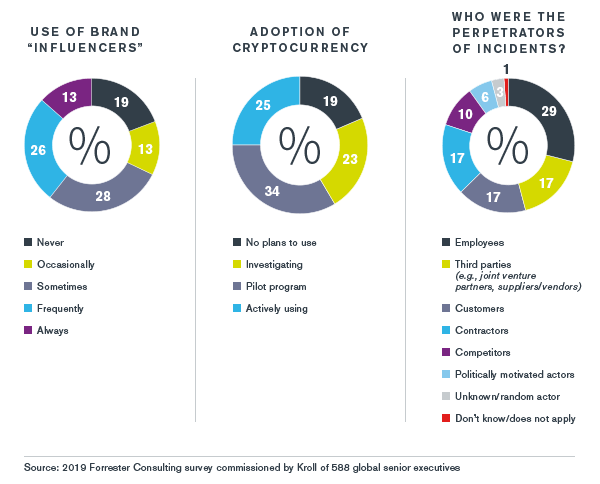The global boom in construction has been heavily affected by current trade wars, which have included tariffs on both raw materials, like steel, and heavy equipment, such as cranes. Within the construction sector (a group that also includes engineering and infrastructure), 38 percent of survey respondents say they have been affected by disruptions due to sanctions, tariffs and changes in trade agreements, second only to the share of respondents in the technology industry. Construction also has the highest percentage of respondents indicating they have been affected by political unrest (60 percent vs. 49 percent for all industries). Sensitivity to this risk is hardly surprising, given the sizable role that government contracts play in this sector.
The construction industry has also been hard-hit by leaks of internal information, with 45 percent of firms reporting significant effects within the last year.

Bribery and corruption have been a perennial risk management challenge for the industry. The share of construction firms (30 percent) affected by these threats is comparatively high, exceeded only by that of the transportation sector. Tellingly, construction has less confidence in its anti-bribery and anti-corruption controls than does any other industry surveyed (51 percent vs. 69 percent for all industries) but is addressing this vulnerability by designating the fight against bribery and corruption a top industry priority (70 percent vs. 62 percent for all industries). Fortunately, our survey results suggest a possible path forward. The percentage of construction industry respondents with confidence in their organization’s data analytics as an effective risk detection method is lower than that of any other industry (66 percent vs. 77 percent for all industries). Further, for all types of incidents, the construction industry’s internal audit function was less likely than average to have uncovered the threat (24 percent vs. 28 percent for all industries). Investing in data analytics to identify patterns of corruption early on could help firms control this risk and strengthen internal audit.
While construction industry respondents believe their anti-bribery and anti-corruption controls to be their least reliable risk mitigation measures, they exhibit skepticism about the efficacy of virtually all such mechanisms, including reputational due diligence of third parties (66 percent vs. 73 percent for all industries) and anti–money laundering controls (62 percent vs. 69 percent for all industries). Collectively, this data reveals that the construction industry has a considerable opportunity to strengthen its risk management controls. In doing so, construction companies should consider involving personnel throughout their organizations; only 64 percent of construction respondents—a smaller share than in any other industry except professional services— agree that risk management programs are designed with input from those who must conform to them (vs. 74 percent for all industries).
Looking to the future, the construction industry is greatly concerned about events that could upend economic and political stability, including possible military conflict (64 percent vs. 51 percent for all industries) and a significant financial crisis (77 percent vs. 69 percent for all industries). Meanwhile, the industry is also paying closer-than average attention to technology-driven disruptions, including market manipulations through fake news (70 percent vs. 59 percent for all industries) and disruptions caused by artificial intelligence (66 percent vs. 56 percent for all industries).


